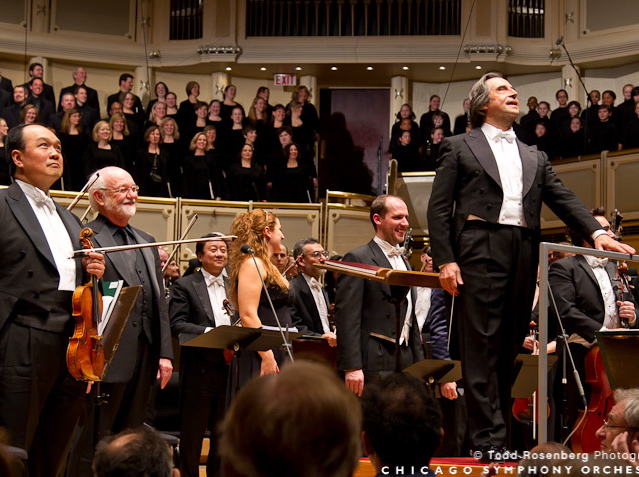Muti returns to Chicago Symphony with an elegant and electrifying “Carmina Burana”

Riccardo Muti, the Chicago Symphony Orchestra and CSO Chorus following ther performance of Orff's "Carmina Burana" Thursday night. Photo: Todd Rosenberg
To add to the hoopla of Riccardo Muti’s return to the podium Thursday night, it was announced earlier in the day that the Chicago Symphony Orchestra and its Italian music director would launch Carnegie Hall’s 2012-13 season with three programs in October.
Muti and the CSO will open the Carnegie season October 3 with Carmina Burana, the first of three New York programs and the principal work on this week’s Chicago concerts.
Carl Orff is remembered almost exclusively for his sprawling 1937 opus, a profane oratorio of sorts inspired by medieval monastic texts that celebrate all the country pleasures of drink, sex and gluttony.
Yet for all its lusty fervor and boisterous choruses, Carmina Burana presents a decidedly bleak and medieval world view — one of intense loneliness, spiritual vacuity, unslaked longing and a kind of compulsive desperation in pursuit of salubrious pleasures. Against the unceasing wheel of fate, man has about as much chance of happiness as Orff’s slow-roasted swan.
Muti has long experience with Carmina Burana, most famously leading a Berlin Philharmonic performance in 1980 in the presence of the 84-year-old composer. Many interpreters prefer to concentrate on the rousing choral moments at the expense of the quiet interior passages. Characteristically Muti gave us both, with a fizzing, at times electrifying performance that made one appreciate the musical ingenuity of Orff’s cantata anew.
Rarely will one hear the massive climaxes put across with this kind of sonic force allied to such airtight ensemble. Muti’s balancing of the large forces was extraordinary even by his standard, with chorus, orchestra and large percussion battery all gleaming and brilliantly manifest. The explosive power of those uninhibited moments was staggering.
Yet just as striking was the tonal elegance of the playing and choral singing as with In Springtime or the vernal freshness of the Round Dance, highlighted by Mathieu Dufour’s flute solos. Muti and the orchestra and chorus consistently brought out the multihued palette of this score, the tender delicacy as well as its primitive rhythmic punch.
The only debit of the evening was the uneven trio of soloists. Soprano Maria Grazia Schiavo was less than grazia Thursday, her shallow tone and hectoring approach resulting in a fluttery, short-breathed In trutina. Countertenor Max Emanuel Cencic proved nearly inaudible in his Song of the Roasted Swan, unable to project, much less bring pathos or wry irony to his solo.
Only Stephane Degout matched the high musical level of Muti, the CSO and CSO chorus. A wonderful Papageno in the Lyric Opera’s recent Magic Flute, the French baritone sang with warm, rounded tone and keen intelligence, avoiding the usual caricature in the song of the dissipated Abbot and bringing a touching, genuine feeling to Dies, nox et omnia.
The Chicago Symphony Orchestra Chorus sang magnificently in one of their finest outings of recent seasons. Duain Wolfe’s singers conveyed the raw fervor as well as the melancholy of Orff’s score, and the Chicago Children’s Choir under Josephine Lee, provided bright-toned vocalism in their brief appearances.
Schubert’s Symphony No. 3 was the welcome palate cleanser of the evening.
Muti is often at his best in cornerstone Austrian repertoire, and so it proved again Thursday. The Italian conductor’s Schubert is more incisive and sharply pointed than most with a middleweight sonority that offers an admirable balance between Viennese refinement and German weight. Yet there was ample charm, particularly in the lilting Allegretto and vigorous Menuetto with rustic and characterful solo work by clarinetist Stephen Williamson and oboist Eugene Izotov, respectively.
Charm was in scant supply in the opening work, Dmitry Smirnov’s Space Odyssey, heard Thursday in its world premiere.
The prolific Russian composer wrote this seven-minute work to recapture some of the lively spirit of the “old-fashioned overtures” that have traditionally opened concerts citing curtain-raisers by Glinka, Verdi and Berlioz as inspirations.
Not in this galaxy. Smirnov’s cacophonous work lurches unconvincingly from martial drums and melancholy wind writing to elephantine bombast. Riffs from Strauss’s Also Sprach Zarathustra fitfully peek through but it is Smirnov’s background as film composer that seems most evident in this noisy, massively overscored music with substance in inverse proportion to its volume. Muti and the orchestra delivered a resounding performance, however, and the composer — rather dismayingly — was enthusiastically applauded by the audience.
The program will be repeated 8 p.m. Friday and Saturday and 7:30 p.m. Tuesday. cso.org; 312-294-3000